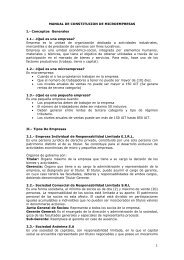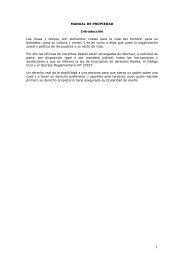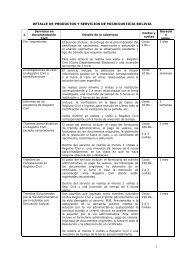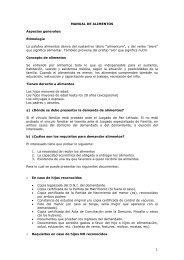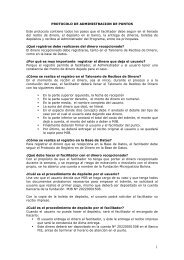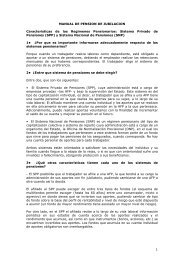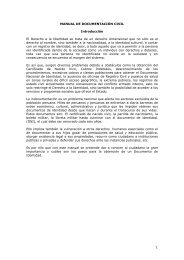ICISS report - International Coalition for the Responsibility to Protect
ICISS report - International Coalition for the Responsibility to Protect
ICISS report - International Coalition for the Responsibility to Protect
Create successful ePaper yourself
Turn your PDF publications into a flip-book with our unique Google optimized e-Paper software.
The <strong>Responsibility</strong> <strong>to</strong> <strong>Protect</strong> 49<br />
6.10 The UN is also <strong>the</strong> symbol of what member states must not do. In <strong>the</strong> field of state–<br />
citizen relations, <strong>the</strong> <strong>to</strong>tality of Charter clauses and instruments like <strong>the</strong> Universal<br />
Declaration of Human Rights restrict <strong>the</strong> authority of states <strong>to</strong> cause harm <strong>to</strong> <strong>the</strong>ir own<br />
people within terri<strong>to</strong>rial borders. In <strong>the</strong> sphere of military action across terri<strong>to</strong>rial borders,<br />
UN membership imposes <strong>the</strong> obligation on <strong>the</strong> major powers <strong>to</strong> refrain from unilateral<br />
intervention in favour of collectively authorized international intervention.<br />
6.11 The responsibility <strong>for</strong> protecting <strong>the</strong> lives and promoting <strong>the</strong> welfare of citizens lies<br />
first and <strong>for</strong>emost with <strong>the</strong> sovereign state, secondly with domestic authorities acting in<br />
partnership with external ac<strong>to</strong>rs, and only thirdly with international organizations. As we<br />
suggested in Chapter 2, in addressing <strong>the</strong> concept of sovereignty as responsibility, a crucial<br />
justification <strong>for</strong> vesting sovereignty in <strong>the</strong> state derives from this principle. There is a gap –<br />
a responsibility deficit – if <strong>the</strong> state proves unable or unwilling <strong>to</strong> protect citizens, or itself<br />
becomes <strong>the</strong> perpetra<strong>to</strong>r of violence against its own citizens.<br />
6.12 The community-sanctioning authority <strong>to</strong> settle issues of international peace and<br />
security has been transferred from <strong>the</strong> great powers in concert <strong>to</strong> <strong>the</strong> UN. The UN, with <strong>the</strong><br />
Security Council at <strong>the</strong> heart of <strong>the</strong> international law-en<strong>for</strong>cement system, is <strong>the</strong> only organization<br />
with universally accepted authority <strong>to</strong> validate such operations. But it does not by<br />
itself have any operational capacity. For <strong>the</strong> UN <strong>to</strong> function effectively as a law-en<strong>for</strong>cing<br />
collective security organization, states must renounce <strong>the</strong> unilateral use of <strong>for</strong>ce <strong>for</strong> national<br />
purposes. But <strong>the</strong> corollary, not always as readily accepted, is that states should be willing<br />
<strong>to</strong> use <strong>for</strong>ce on behalf of, as directed by, and <strong>for</strong> <strong>the</strong> goals of <strong>the</strong> UN.<br />
THE SECURITY COUNCIL’S ROLE – AND RESPONSIBILITY<br />
6.13 Because <strong>the</strong> prohibitions and presumptions against intervention are so explicitly<br />
spelled out in <strong>the</strong> Charter, and since no “humanitarian exception” <strong>to</strong> <strong>the</strong>se prohibitions is<br />
explicitly provided <strong>for</strong>, <strong>the</strong> role of <strong>the</strong> Security Council becomes of paramount importance.<br />
There are a number of questions that can reasonably be asked about its authority and<br />
credibility, and we address <strong>the</strong>m below: its legal capacity <strong>to</strong> authorize military intervention<br />
operations; its political will <strong>to</strong> do so, and generally uneven per<strong>for</strong>mance; its unrepresentative<br />
membership; and its inherent institutional double standards with <strong>the</strong> Permanent Five ve<strong>to</strong><br />
power. There are many reasons <strong>for</strong> being dissatisfied with <strong>the</strong> role that <strong>the</strong> Security Council<br />
has played so far.<br />
6.14 But all that said, <strong>the</strong> Commission is in absolutely no doubt that <strong>the</strong>re is no better or<br />
more appropriate body than <strong>the</strong> Security Council <strong>to</strong> deal with military intervention issues<br />
<strong>for</strong> human protection purposes. It is <strong>the</strong> Security Council which should be making <strong>the</strong> hard<br />
decisions in <strong>the</strong> hard cases about overriding state sovereignty. And it is <strong>the</strong> Security Council<br />
which should be making <strong>the</strong> often even harder decisions <strong>to</strong> mobilize effective resources,<br />
including military resources, <strong>to</strong> rescue populations at risk when <strong>the</strong>re is no serious opposition<br />
on sovereignty grounds. That was <strong>the</strong> overwhelming consensus we found in all our<br />
consultations around <strong>the</strong> world. If international consensus is ever <strong>to</strong> be reached about<br />
when, where, how and by whom military intervention should happen, it is very clear that<br />
<strong>the</strong> central role of <strong>the</strong> Security Council will have <strong>to</strong> be at <strong>the</strong> heart of that consensus. The<br />
task is not <strong>to</strong> find alternatives <strong>to</strong> <strong>the</strong> Security Council as a source of authority, but <strong>to</strong> make<br />
<strong>the</strong> Security Council work much better than it has.



